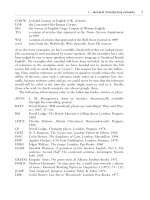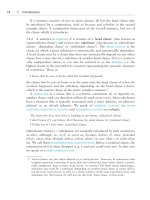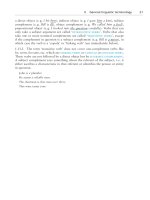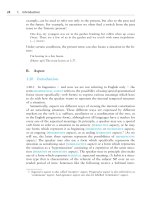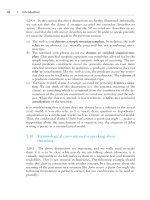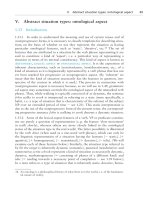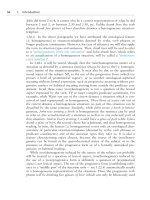The grammar of the english verb phrase part 7 pps
Bạn đang xem bản rút gọn của tài liệu. Xem và tải ngay bản đầy đủ của tài liệu tại đây (74.93 KB, 7 trang )
III. Meaning categories expressed by verb forms 35
in English. Otherwise, habitual meaning is normally expressed by a nonpro-
gressive verb form, often in combination with a repetitive adverb like habitu-
ally, usually, normally, etc.:
At the time I wasn’t yet attracted by girls. I simply ignored them.
I don’t drive to work. I take the bus or walk.
John {habitually / mostly / usually} skips breakfast because he gets up too late.
In the latter two examples, the habit referred to is located at t
0
and is not
represented as restricted in time, so that it is interpreted as a
permanent habit.
However, a habit including t
0
can also be represented as restricted in time (i. e.
as temporary) by the use of the progressive form. In that case the accompanying
adverbial, if any, is a durative time adverbial rather than a repetitive one:
We aren’t eating any beef these days because pork is exceptionally cheap.
She’s sleeping on the veranda while this hot weather lasts.
The use of a progressive form here leads to a habituality reading of a particular
kind: the situation is conceived of as repetitive and as forming a
temporary
habit
. (This does not mean, however, that the progressive itself is a marker of
habitual aspect. In the above examples, it still expresses imperfective aspect
and the ‘repetitive habit’ interpretation arises largely via common sense reason-
ing and ‘knowledge of the world’ Ϫ for example, we know that people do not
normally eat uninterruptedly for several days.)
1.23.3 A habit is a state (viz. a characteristic) which may or may not involve
repetition: I used to love that kind of music versus I used to go to the cinema
three times a week. Because a habit is a state, and states are ‘homogeneous’
(i. e. they hold at every time in the course of their existence Ϫ see 1.36), none
of the instantiations of a
repetitive habit need actually be in progress at the
time at which the habit as a whole is located. Thus, both We take a walk after
breakfast and We’re taking a walk after breakfast these days can be uttered (to
express a habit) at any moment of the day: for these sentences to be true it is
not necessary that the speaker should actually be walking at speech time. (As
we will see in 3.1.1, the present tense locates the habit at the time of speech.)
1.24 Repetitive vs semelfactive aspect
1.24.1 There is repetitive (or iterative) grammatical aspect when the verb
takes on a special form (suffix or auxiliary) to describe a situation as repeating
itself on one or more occasions or as consisting of a number of subsituations
of the same kind. In English, which does not have special verb-marking for
this meaning, and thus does not have formal iterative aspect, repetitive meaning
36 1. Introduction
is expressed by other means, such as the use of a repetitive adverbial (e. g.
repeatedly, over and over), a frequency adverbial (e. g. sometimes, often)ora
plural or collective subject or complement NP accompanied by a nonpro-
gressive tense form.
The murderer repeatedly coshed his victim on the head.
I sometimes see her off at the station.
Betty writes {poems / poetry}.
Over 1,000 people have visited the exhibition so far.
However, when the reference is to a punctual (nondurative) situation, an itera-
tive reading can arise through the use of a progressive verb form. (Again, this
does not mean that the progressive itself is a marker of iterative aspect.)
All the time I was sp eaking John was nodding assent. (repeated movements of the head)
Someone was tapping on the window.
He was jumping up and down.
The mechanism used here to represent a punctual situation as repeating itself
is to use a form (viz. the progressive) which requires the situation to be dura-
tive. The only means of resolving the apparent contrast between punctuality
and durativeness is to assume that there is a durative ‘
hypersituation’ con-
sisting of a number of repeated punctual ‘
subsituations’.
The same meaning of ‘repetition on one occasion’ can be expressed by a
repetition of an intransitive verb:
He jumped and jumped and jumped.
1.24.2 The opposite of repetitive meaning is semelfactive or nonrepetitive
meaning. There is a semelfactive meaning when the reference is to a single
individual actualization of a situation. This can either be referred to as a whole
(e. g. I had a walk last night) or (provided it is durative) as ‘ongoing’ (e. g. I
was having a walk or I felt confused [when he said that]).
1.24.3 The term ‘iterative’ is sometimes used in a narrower sense than ‘repeti-
tive’. ‘Iterativeness’ is then defined as the description of a situation as repeating
itself on a particular occasion, i. e. the representation of a situation as con-
sisting of the successive occurrence of several instances of identical subsitu-
ations. The sentence Bill knocked at the front door allows this interpretation
(as well as a semelfactive one). This sense only represents one type of repetitive-
ness. There is a repetitive meaning not only if a situation repeats itself on the
same occasion Ϫ in which case the repetition causes the instances of the situa-
tion to be ‘subsituations’ of a single ‘hypersituation’ Ϫ but also if there is
repetition of the same kind of situation on different occasions (e. g. I’ve only
been in this town three times; I sometimes called on her when I needed help).
In this work we will apply the labels ‘repetitive’ and ‘iterative’ to both these
III. Meaning categories expressed by verb forms 37
interpretations. It should be borne in mind, however, that it is only on the first
interpretation Ϫ the situation is represented as a hypersituation consisting of
similar subsituations Ϫ that the definition of grammatical aspect as the repre-
sentation of the internal temporal structure of the situation referred to is satis-
fied.
1.24.4 As pointed out in 1.23, reference to a repetitive situation leads to the
idea of ‘
repetitive habit’ if the repeated actualization of the situation is seen
as characteristic of the referent of the subject NP over an extended period of
time, as in My sister spends her holidays at the seaside. This shows that aspec-
tual meanings are not mutually exclusive. This conclusion is also illustrated by
Sharon is paying her bills on time these days, which represents the situation
referred to as progressive, repetitive and forming a temporary habit. That is,
the progressive form implies that the durative situation consists of repeated
instances of the punctual situation of Sharon paying a bill on time. This dura-
tive overall situation is interpreted as forming a habit which is characteristic
of Sharon. Due to the meaning of the progressive and the presence of these
days, this habit is interpreted as a temporary habit.
1.25 Aspectual form vs aspectual meaning
Grammatical aspect has been defined as the use of aspectual verb forms or
auxiliaries to express aspectual meanings. We have seen that English is very
poor where special aspectual verb forms are concerned. The only possibilities
are the progressive form (to express progressive meaning), the auxiliaries will
and would (to express repetition of a situation as forming a present or past
habit) and the semi-auxiliary used to (referring to a past habit). This does not
mean, however, that the other aspectual meanings are irrelevant to English. It
is simply that they have to be expressed in ways other than by the use of special
suffixes or auxiliaries.
1.26 Perfect aspect?
1.26.1 Apart from the aspects referred to above, some linguistic works also
speak of ‘perfect aspect’ in English. This term is introduced to capture the
observation that when one of the English perfect tenses is used, the situation
referred to is often viewed from a particular perspective, namely from the per-
spective of the time when a result yielded by, or the relevance of, an anterior
situation expressed by the perfect form is perceptible. In this terminology, I
have had a walk expresses perfect aspect, because it can suggest something like
‘I’m feeling rather {tired / hot / cold} now’, ‘That explains my being wet’,
38 1. Introduction
etc. Ϫ present results which are not hinted at by I had a walk, which is there-
fore claimed not to express ‘perfect aspect’.
However, the concept ‘
perfect aspect’ is suspect, for two reasons. Firstly,
the ‘perspective’ referred to above is a temporal viewpoint, i. e. a ‘time of
orientation’ (see section 2.14) to which the situation expressed by the verb
phrase have a walk is anterior. The expression of anteriority to a time of
orientation is a question of tense, not of aspect. Secondly, the concept ‘perfect
aspect’ does not conform to our definition of aspect, because the selection of
a perfect or nonperfect tense is not a question of different ways of representing
the internal temporal constitution of a situation. While we admit that the pres-
ent perfect implies some kind of ‘current relevance’ (see 5.35), we see no reason
for treating this as a kind of aspect.
1.26.2 In some linguistic works the term ‘perfective aspect’ is used to indicate
the idea of current relevance which is said to be the core meaning of what we
call the ‘perfect tenses’. Similarly, nonperfect tenses (such as the preterite) are
claimed to express ‘imperfective aspect’. Apart from the fact that we treat the
present perfect, past perfect, future perfect and ‘conditional’ perfect as tenses,
not aspects (see 1.26), it should be evident that the perfective / imperfective
distinction as we have defined it does not coincide with the distinction between
perfect tenses and other tenses. Consider:
John has been painting his house. (The verb form is in the present perfect tense and
implies the idea of a present result Ϫ John’s house is partly painted now Ϫ but it
expresses progressive (imperfective) aspect: the telic situation is not referred to in its
entirety: it is represented as in progress, and hence as incomplete.)
After her death we found fragments of a novel that she had been writing. (The verb
form is in the past perfect tense and implies current relevance at the time of her
death: the work had resulted in the existence of a partly finished novel. However,
the verb form expresses progressive (imperfective) aspect: the writing of the novel is
not represented as complete: she was still in the middle of writing the novel when
she died.)
In short, ‘perfect’ is a category pertaining to tense, while ‘perfective’ is a cat-
egory pertaining to aspect. Since tense and aspect are linguistic categories of a
totally different kind, we should be careful not to confuse the terms ‘perfect’
and ‘perfective’.
C. Mood and modality
1.27 Definition of mood and modality
1.27.1 The term modality is used to refer to a semantic category that com-
prises two types of meaning: the representation of the speaker’s assessment of
the likelihood that a proposition (i. e. the content of a clause) is true (or that
III. Meaning categories expressed by verb forms 39
the situation referred to by a proposition actualizes), and the representation of
one of the factors affecting the (non)actualization of the situation referred to,
such as (un)willingness, (im)possibility, (in)ability, obligation, necessity, advis-
ability, permission, prohibition, volition, etc. Modality which has to do with
the truth of the utterance is called
epistemic modality. The other type is
referred to as
nonepistemic (or root) modality. This type comprises both
modality which has to do with the speaker’s attitude towards the actualization
of a situation (e. g. You must pay me back now!), and modality which has to
do with other factors affecting the (non)actualization of the situation referred
to, such as the presence or absence of willingness (e. g. I won’t help you if you
don’t pay me), possibility (e. g. Aerosols can explode) or ability (e. g. John
can swim).
1.27.2 Modality, which has to do with meaning, should be distinguished from
mood, which is a grammatical (formal) category. It refers to the systematic use
of lexical verb forms not preceded by a modal auxiliary to express particular
kinds of modal meaning. English has three moods, viz. the indicative, the im-
perative and the subjunctive. These moods reflect different ways in which a
clause may function in communication.
I {left / am leaving / will leave} early. (indicative)
Shut up! (imperative)
[An athlete must have a balanced diet], be she resting or training. (subjunctive)
Apart from these moods, modality in English is especially expressed by the use
of modal auxiliaries (must, would, etc.) and modal adverbs (possibly, cer-
tainly, etc.).
40 1. Introduction
IV. The precise meanings and uses of ‘situation’
and ‘actualization’
1.28 Definition of ‘situa tion’ , ‘actualize’ and ‘actualization’
As noted in 1.5, we will use situation as a cover term for the various possible
types of contents of clauses, i. e. as a cover term for anything that can be
expressed by a clause, namely an action, an event, a process or a state. Unless
it is necessary to distinguish between these possibilities, we will speak of ‘the
situation referred to’. The verb
actualize will be similarly used as a cover
term for the predicates that are typically associated with one of these situation
types. Thus, when it is irrelevant whether a clause refers to the performance
of an action, the happening of an event, the existence of a state, etc. we can
say that the clause in question refers to the actualization of a situation.
In 1.5 it has been stressed that we will use actualize as an intransitive verb
(similar to happen). Thus, we will say that John is painting his house expresses
that the situation of John painting his house ‘is actualizing’ (rather than that
the situation ‘is being actualized’).
1.29 Situation: meaning (denotation) versus reference
1.29.1 To explain the notions ‘denotation’ and ‘reference’ with respect to the
verb and the verb phrase, we will start by drawing an analogy with nouns and
noun phrases.
A noun like boy has a lexical meaning. The paraphrase ‘young male human
being’ is an attempt at describing this. The noun can be used as the head of a
noun phrase (e. g. the noun boy is the head of the noun phrase the boy). Such
a noun phrase has both a meaning and (if it is used in an utterance) a referent.
The meaning (or
denotation) of the noun phrase results from a combination
of the lexical meaning of boy and the grammatical meaning of the definiteness
marker the.The
referent (which comes into the picture only when the NP is
used in a spoken or written utterance) is a particular boy who the ‘utterer’
(speaker or writer) assumes the addressee (hearer or reader) can identify on
‘receiving’ (hearing or reading) the noun phrase the boy.
In a similar way, a verb like walk has a denotation (lexical meaning). This
denotation can be called a
simple situation-template because by combining
other constituents (minimally a subject) with the verb we can build a clause
denoting a situation, as in John walked or John walked to the church. A ‘sim-
ple situation-template’ (denoted by a verb) can be turned into an
enriched
situation-template
by the addition of one or more complements or adverbials
to the verb. Multi-word predicate constituents like walk to the church or walk
IV. The precise meanings and uses of ‘situation’ and ‘actualization’ 41
to the church at five p.m. yesterday denote a situation-template which contains
more information than the simple situation-template denoted by walk.The
denotation of such a complex predicate constituent is determined in the first
instance by the meanings of the verb and of the other components of the predi-
cate constituent (as defined in 1.7) and the semantic relations between them.
If a verb, VP or predicate constituent is uttered, it has a referent, which is
an
abstract situation type. By ‘abstract’ we mean that there is no reference
to an actualizing situation: an abstract situation type is a mental construct, a
type of situation as it is conceptualized by the speaker without reference to any
concrete actualization. Thus, run slowly, be tall, increase, etc. refer to different
abstract situation types.
1.29.2 A clause is a combination of a subject NP and a predicate constituent
which minimally contains a VP (verb phrase).
12
The denotation of a clause is
a situation. When the clause is uttered, it is used to refer to something. (A
referent of a linguistic expression is something whose existence in the / an
extralinguistic world is asserted or questioned.) The referent of the clause is
then the actualization of the situation in question.
13
1.29.3 What has been said so far is summarized in the following chart:
linguistic expression denotation of the referent of the linguistic
linguistic expression expression when uttered
verb (e. g. walk) simple situation-template abstract type of situation
verb phrase enriched situation-template abstract type of situation
(e. g. walk to the church)
predicate constituent further enriched situation- abstract type of situation
(e. g. walk to the church template
merrily on Sundays)
clause (e. g. On Sundays situation actualization of the
they walk to the church situation
merrily.)
12. As noted in 1.7, we analyse a prototypical clause as consisting of a subject NP and a predicate
constituent. The latter consists of the verb phrase (VP) and the optional adverbial(s), if any.
T he VP consists of the verb form (ϭ verb ϩ auxiliaries, i f any) ϩ the complements (ϭ direct
object, indirect object, subject complement, object complement, prepositional object (ϭ ob-
ject of a prepositional verb) ϩ necessary adverbial(s), if any). T hus in John put the book on
the table this morning, the subject NP is John, the VP is put the book on the table, and the
predicate constituent is put the book on the table this morning.
13. Some nonfinite clauses do not have a referent, e. g. the infinitive clause in F or John to do that
is unthinkable. Other nonfinite clauses do have a referent (because they assert actualization),
e. g. the participle clause in Jumping over the fence, I hurt my ankle. As this is not the place
to go into the question under what conditions a nonfinite clause has a referent, we will only
consider finite (tensed) clauses in this section. Imperatives too will be disregarded.


